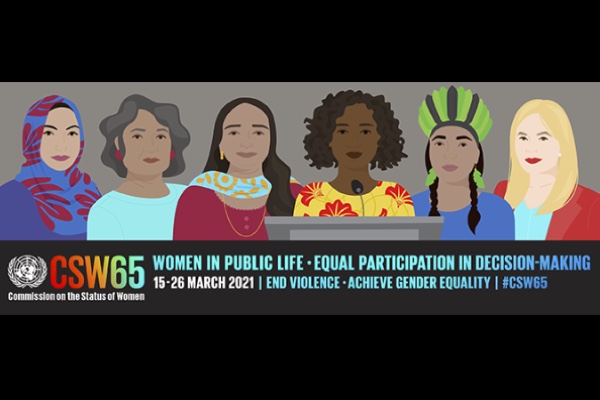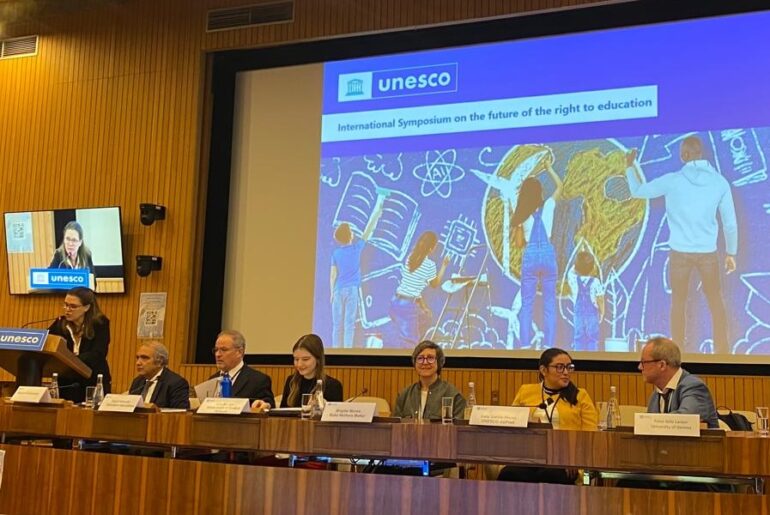Mothers make great leaders – But face systemic barriers to participation and decision-making in public life
14.03.21
UN New York, CSW - MMM's written statement ahead of the 65th session of the UN Commission on the Status of Women points to the inequitable distribution of unpaid family care work as the main systemic barrier. It also provides recommendations to address this issue.

There are many examples of women as mothers, raising their voices for justice and change ranging from the Argentinian mothers of the Plaza de Mayo, to the current mobilisation of mothers of children with disabilities against corruption in Bulgaria. In addition, the current Covid-19 crisis epitomizes women and mothers’ abilities, resilience, and their central role as essential workers and stakeholders in the home, in the labour market, and in social and public life at all levels.
The pandemic challenges the stark choices societies will have to make to build back better or to build forward better and how this can be achieved. In this particular context, women and mothers’ activism and advocacy, their fight for their rights, for education, social sustainability, climate justice, and peace, for better economic opportunities and empowerment is indeed a daunting challenge and calls for a systemic change.
MMM firmly believes that this crisis represents an opportunity to bring about this change, especially with regards to the purpose and functioning of our economies. The crisis clearly shows the limits of our current economic system, which is based on endless GDP growth and prioritizes profits over life. It completely ignores the essential value of unpaid care work as well as that of our natural environment, both of which subsidize the monetized economy as they are currently considered endless and free resources – a fact that feminist economists have long highlighted. Indeed, the 2020 Oxfam report “It is time to care” asserts that the monetary value of unpaid care work globally for women aged 15 and over is at least $10.8 trillion annually –three times the size of the world’s tech industry. Another staggering figure that asks for action.
Therefore, we at MMM call on governments and other stakeholders to:
- Take action: Covid-19 and its economic devastation offers a unique opportunity to move beyond GDP and prioritize care for well-being, sustainability and equity in our economy and the education of girls as a capital investment for development.
- Create policies promoting education and care that must not be considered as expenses but high return investments. Scientific evidence for example now points to how early childhood development, epitomizing the basic and essential needs that all human beings should receive to thrive, would enable in return a healthier and more stable society.
- Mainstream care into all policy-making, not only by enabling quality care services but by supporting parents in their caring responsibilities: maternity leave benefits, and then, parental leaves, shared parental leaves, flexible work conditions, and the expansion of a family friendly labour market. Investing in care for a sustainable economic and social environment will generate jobs and reduce the gender employment gap.
- Implement policies targeting men and encouraging them to take their share in care work. It is also proven that when men commit to their caring responsibilities in the family, violence towards women and children diminish in significant proportions. Promundo MenCare programs targeting young fathers in some African countries illustrate this fact. It also leads to a shift in mentalities when men themselves become concerned about these issues.
- Address the issue of unpaid care and domestic work globally, which is essential to achieving sustainable and consistent Gender equality.
- Provide quality education for all. The importance of education underpins all human achievements, including care work. Education policies correlate with care policies. Educated mothers and fathers, produce better-educated and healthier children. Likewise, parental education benefits not only families and children, but also societies and countries as a whole.
- Make Education an absolute priority for girls: It is only through education that women and girls can be empowered and have access to equal opportunities. Without education for all, the prospects for the development of an inclusive, just and peaceful society collapses. Only educated women can fully participate, access government, lead communities, and contribute to realizing the goals of the Sustainable Development Agenda.
Care and education are two major leverages for a more inclusive, gender balanced, peaceful and sustainable society. The empowerment of women and their full participation in all sectors, since they represent half of humanity, are crucial to the implementation of the SDGs.
Moreover, the severity of the ongoing health crisis calls for a paradigm shift in the way we run our economies and what we prioritize through our economic system. It has never worked well for women, who keep things running whilst being underrepresented in decision-making. With Care and Education as major tools, it is time that we move beyond GDP growth and profit making as the main drivers of our economies. Instead, the wellbeing of both people and the planet must be the core objectives of our economies, and new indicators must be used that integrate and support these wellbeing objectives to guide government budgeting and policymaking – with women adequately represented in decision making.
Read the full written statement MMM submitted ahead of CSW65
The 65th session of the UN Commission on the Status of Women (CSW65) will take place virtually from 15 to 25 March 2021, with as a priority theme: Women’s full and effective participation and decision-making in public life, as well as the elimination of violence, for achieving gender equality and the empowerment of all women and girls.
The New EU Gender Equality Roadmap : A Call for Inclusion of Mothers
04.03.25
The European Commission’s initiative on a new Gender Equality Roadmap post-2025, marks a significant step forward in addressing gender disparities across the European Union. Make Mothers Matter (MMM
Breaking the Cycle: Gender Equality as a Path to Better Mental Health
18.03.25
The Council of the European Union has taken a decisive step in recognising the vital connection between gender equality and mental health.
Europe Must Listen to Mothers: Our landmark report heads to the European Parliament
28.08.25
On 22 September 2025, the voices of mothers will take centre stage in Brussels. For the first time, Make Mothers Matter (MMM) will present its State of Motherhood in Europe








